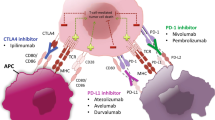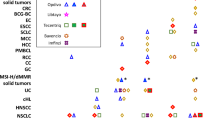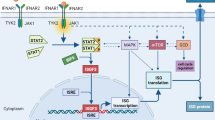Abstract
Purpose of Review
Interleukin-10 (IL-10) is a cytokine with anti-inflammatory properties, which induces activation and proliferation of antigen-activated intratumoral CD8+ T cells. This review discusses the evolution of pegylated IL-10 (pegilodecakin) from preclinical investigation through first-in-human studies in oncology.
Recent Findings
Pegilodecakin was evaluated across multiple advanced solid tumors in a large phase 1/1b trial alone and in combination with chemotherapy or anti-PD-1 antibodies. Pegilodecakin monotherapy had immunologic and clinical activity in renal cell carcinoma (RCC) and uveal melanoma. In combination with anti-PD-1 inhibitors, pegilodecakin increased the responses in RCC and lung cancer with efficacy agnostic to PD-L1 status and tumor mutational burden. Pegilodecakin with FOLFOX had activity in pretreated pancreatic cancer, instructing the ongoing randomized phase III trial of the combination versus FOLFOX.
Summary
The increased half-life of pegilodecakin enabled compelling preclinical data for IL-10 which has now been confirmed by clinical activity in a variety of cancers. The ability of pegilodecakin to both exert anti-tumor immunity and inhibit tumor-associated inflammation characterizes the uniqueness of this cytokine therapy.

Similar content being viewed by others
References
Papers of particular interest, published recently, have been highlighted as: • Of importance
Moore KW, de Waal MR, Coffman RL, O’Garra A. Interleukin-10 and the interleukin-10 receptor. Annu Rev Immunol. 2001;19:683–765.
Maynard CL, Harrington LE, Janowski KM, Oliver JR, Zindl CL, Rudensky AY, et al. Regulatory T cells expressing interleukin 10 develop from Foxp3+ and Foxp3- precursor cells in the absence of interleukin 10. Nat Immunol. 2007;8(9):931–41.
Emmerich J, Mumm JB, Chan IH, LaFace D, Truong H, McClanahan T, et al. IL-10 directly activates and expands tumor-resident CD8(+) T cells without de novo infiltration from secondary lymphoid organs. Cancer Res. 2012;72(14):3570–81.
Fiorentino DF, Bond MW, Mosmann TR. Two types of mouse T helper cell. IV. Th2 clones secrete a factor that inhibits cytokine production by Th1 clones. J Exp Med. 1989;170(6):2081–95.
O'Garra A, Barrat FJ, Castro AG, Vicari A, Hawrylowicz C. Strategies for use of IL-10 or its antagonists in human disease. Immunol Rev. 2008;223:114–31.
Chen WF, Zlotnik A. IL-10: a novel cytotoxic T cell differentiation factor. J Immunol. 1991;147(2):528–34.
Finbloom DS, Winestock KD. IL-10 induces the tyrosine phosphorylation of tyk2 and Jak1 and the differential assembly of STAT1 alpha and STAT3 complexes in human T cells and monocytes. J Immunol. 1995;155(3):1079–90.
Lauw FN, Pajkrt D, Hack CE, Kurimoto M, van Deventer SJ, van der Poll T. Proinflammatory effects of IL-10 during human endotoxemia. J Immunol. 2000;165(5):2783–9.
Kuhn R, Lohler J, Rennick D, Rajewsky K, Muller W. Interleukin-10-deficient mice develop chronic enterocolitis. Cell. 1993;75(2):263–74.
Glocker EO, Kotlarz D, Boztug K, Gertz EM, Schäffer AA, Noyan F, et al. Inflammatory bowel disease and mutations affecting the interleukin-10 receptor. N Engl J Med. 2009;361(21):2033–45.
Berg DJ, Davidson N, Kuhn R, et al. Enterocolitis and colon cancer in interleukin-10-deficient mice are associated with aberrant cytokine production and CD4(+) TH1-like responses. J Clin Invest. 1996;98(4):1010–20.
• Mumm JB, Emmerich J, Zhang X, et al. IL-10 elicits IFNgamma-dependent tumor immune surveillance. Cancer Cell. 2011;20(6):781–96. This manuscript reported a wealth of preclinical data demonstrating that in mice, PEG-rMuIL10 increased CD8+ T cell infiltration in tissue, induced IFNγ expression, and led to an effective T cell memory response. These experiments provided the foundation for use of PEG-rMuIL10 in first-in-human trials.
Neven B, Mamessier E, Bruneau J, Kaltenbach S, Kotlarz D, Suarez F, et al. A Mendelian predisposition to B-cell lymphoma caused by IL-10R deficiency. Blood. 2013;122(23):3713–22.
Fedorak RN, Gangl A, Elson CO, Rutgeerts P, Schreiber S, Wild G, et al. Recombinant human interleukin 10 in the treatment of patients with mild to moderately active Crohn’s disease. The Interleukin 10 Inflammatory Bowel Disease Cooperative Study Group. Gastroenterology. 2000;119(6):1473–82.
van Deventer SJ, Elson CO, Fedorak RN. Multiple doses of intravenous interleukin 10 in steroid-refractory Crohn’s disease. Crohn’s Disease Study Group. Gastroenterology. 1997;113(2):383–9.
Asadullah K, Docke WD, Ebeling M, et al. Interleukin 10 treatment of psoriasis: clinical results of a phase 2 trial. Arch Dermatol. 1999;135(2):187–92.
Asadullah K, Sterry W, Volk HD. Interleukin-10 therapy--review of a new approach. Pharmacol Rev. 2003;55(2):241–69.
Marlow GJ, van Gent D, Ferguson LR. Why interleukin-10 supplementation does not work in Crohn’s disease patients. World J Gastroenterol. 2013;19(25):3931–41.
Kimball AB, Kawamura T, Tejura K, et al. Clinical and immunologic assessment of patients with psoriasis in a randomized, double-blind, placebo-controlled trial using recombinant human interleukin 10. Arch Dermatol. 2002;138(10):1341–6.
Tilg H, van Montfrans C, van den Ende A, Kaser A, van Deventer S, Schreiber S, et al. Treatment of Crohn's disease with recombinant human interleukin 10 induces the proinflammatory cytokine interferon gamma. Gut. 2002;50(2):191–5.
McInnes IB, Illei GG, Danning CL, et al. IL-10 improves skin disease and modulates endothelial activation and leukocyte effector function in patients with psoriatic arthritis. J Immunol. 2001;167(7):4075–82.
Berman RM, Suzuki T, Tahara H, Robbins PD, Narula SK, Lotze MT. Systemic administration of cellular IL-10 induces an effective, specific, and long-lived immune response against established tumors in mice. J Immunol. 1996;157(1):231–8.
Zheng LM, Ojcius DM, Garaud F, Roth C, Maxwell E, Li Z, et al. Interleukin-10 inhibits tumor metastasis through an NK cell-dependent mechanism. J Exp Med. 1996;184(2):579–84.
Groux H, Cottrez F, Rouleau M, et al. A transgenic model to analyze the immunoregulatory role of IL-10 secreted by antigen-presenting cells. J Immunol. 1999;162(3):1723–9.
• Naing A, Papadopoulos KP, Autio KA, et al. Safety, antitumor activity, and immune activation of pegylated recombinant human interleukin-10 (AM0010) in patients with advanced solid tumors. J Clin Oncol. 2016;34(29):3562–9. This manuscript reported on the early experiences of pegilodecakin as monotherapy in the dose escalation all solid tumor cohort with identification of a manageable toxicity profile and preliminary efficacy. A renal cell carcinoma expansion cohort at 20 μg/kg was also reported in this manuscript which demonstrated a 27% ORR.
Motzer RJ, Tannir NM, McDermott DF, Arén Frontera O, Melichar B, Choueiri TK, et al. Nivolumab plus ipilimumab versus sunitinib in advanced renal-cell carcinoma. N Engl J Med. 2018;378(14):1277–90.
Tilg H, Ulmer H, Kaser A, Weiss G. Role of IL-10 for induction of anemia during inflammation. J Immunol. 2002;169(4):2204–9.
• Naing A, Infante JR, Papadopoulos KP, et al. PEGylated IL-10 (pegilodecakin) induces systemic immune activation, CD8(+) T cell invigoration and polyclonal T cell expansion in cancer patients. Cancer Cell. 2018;34(5):775–791.e773. This manuscript provides data from the phase 1/1b trial demonstrating immune activation in patient samples. Induction of IFNγ and granzyme B and proliferation of LAG3+PD-1+ CD8 T cells were demonstrated, as well as expansion of T cell clones not detected at baseline.
Hecht JR, Naing A, Falchook GS, et al. Overall survival of PEGylated human IL-10 (AM0010) with 5-FU/LV and oxaliplatin (FOLFOX) in metastatic pancreatic adenocarcinoma (PDAC). J Clin Oncol 2018;36(4_suppl):374–374.
Robert M, Jarlier M, Gourgou S, Desseigne F, Ychou M, Bouché O, et al. Retrospective analysis of CA19-9 decrease in patients with metastatic pancreatic carcinoma treated with FOLFIRINOX or gemcitabine in a randomized phase III study (ACCORD11/PRODIGE4). Oncology. 2017;93(6):367–76.
Pelzer U, Hilbig A, Sinn M, et al. Value of carbohydrate antigen 19-9 in predicting response and therapy control in patients with metastatic pancreatic cancer undergoing first-line therapy. Front Oncol. 2013;3:155.
• Naing A HJ, Papadopoulos KP et al. Responses and durability of clinical benefit in renal cell carcinoma treated with pegilodecakin in combination with anti-PD-1 inhibitors (oral presentation). Presented at: European Society of Medical Oncology.2018. This oral presentation at ESMO 2018 summarizes much of the clinical efficacy experience in NSCLC and RCC for the combination of pegilodecakin with PD-1 inhibitors.
Motzer RJ, Rini BI, McDermott DF, et al. Nivolumab for metastatic renal cell carcinoma: results of a randomized phase II trial. J Clin Oncol Off J Am Soc Clin Oncol. 2015;33(13):1430–7.
Garon EB WD, Schneider JG , et al.. Responses and durability of clinical benefit in NSCLC treated with pegilodecakin in combination with anti-PD-1 inhibitors. European Society of Medical Oncology; 2018; Munich.
Garon EB, Rizvi NA, Hui R, Leighl N, Balmanoukian AS, Eder JP, et al. Pembrolizumab for the treatment of non-small-cell lung cancer. N Engl J Med. 2015;372(21):2018–28.
Borghaei H, Paz-Ares L, Horn L, Spigel DR, Steins M, Ready NE, et al. Nivolumab versus docetaxel in advanced nonsquamous non-small-cell lung cancer. N Engl J Med. 2015;373(17):1627–39.
Reck M, Rodriguez-Abreu D, Robinson AG, et al. Pembrolizumab versus chemotherapy for PD-L1-positive non-small-cell lung cancer. N Engl J Med. 2016;375:1823–33.
Garon EB WD, Schneider JG et al. Responses and durability in NSCLC treated with pegilodecakin and anti-PD-1. Paper presented at: International Association for the Study of Lung Cancer (IASLC)/World Conference on Lung Cancer. 2018; Toronto, Canada.
Author information
Authors and Affiliations
Corresponding author
Ethics declarations
Conflict of Interest
Karen Autio has received research funding (paid to her institution) from ARMO Biosciences, Eli Lilly, Pfizer, Merck, GlaxoSmithKline, and CytomX.
Martin Oft is a full-time employee of ARMO Biosciences, a fully owned subsidiary of Eli Lilly and Company.
Human and Animal Rights and Informed Consent
This article does summarize human studies performed by the authors and all patients signed informed consent forms approved by their institutions.
Additional information
Publisher’s Note
Springer Nature remains neutral with regard to jurisdictional claims in published maps and institutional affiliations.
This article is part of the Topical Collection on Evolving Therapies
Rights and permissions
About this article
Cite this article
Autio, K., Oft, M. Pegylated Interleukin-10: Clinical Development of an Immunoregulatory Cytokine for Use in Cancer Therapeutics. Curr Oncol Rep 21, 19 (2019). https://doi.org/10.1007/s11912-019-0760-z
Published:
DOI: https://doi.org/10.1007/s11912-019-0760-z




